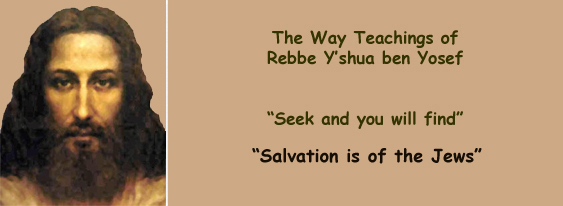January 15, 2013
-
Doctrinal Clarifications
Noahide Studies
שמע ישראל ה 'הוא האלוהים שלנו הוא אחד
Shema Yisrael Adonai Elohaynu Adonai Echad
Hear, Israel, Adonai is our God, Adonai is One.

Mini Lessons: Doctrinal Clarifications
- R: Perhaps you have addressed the following terms in the studies, and I have overlooked them. But could you, please, define for me, and give the similarities/differences for, the following terms as they apply to HaShem, Yeshua, and our family/friends?
JoA: I don't believe I directly address most of these in the lessons, but I'll be happy to do so now.
- R:
Honor
- - We, of course, are to honor HaShem and honor our parents. In what ways do we show honor to HaShem, Yeshua, and to others?
JoA: HaShem: The number one way one honors HaShem is through Torah observance (i.e. by observing the 613 mitzvot for Jews, the 7 mitzvot for Noahides (Gentiles) with ones complete heart, mind and soul. We also honor HaShem by dealing properly with others (I John 4:20).
Y'shua: The Rebbe taught that if we would honor him we must follow his teachings (John 14:15) and seek harmony with HaShem as he does (John 17:11).
Others: Deal honestly with others in love and compassion (Micah 6:6-8, Matthew 22:36).
- R: Praise - We, also, are to give praise to HaShem and we praise others, like our children. Can we praise Yeshua?
JoA: "Praise" means different things to different people and under different circumstances. ONLY HaShem is deserving of praise (honor, worship etc). However, by His mercy He bestows great potential on all of His creation. People seek to manifest their potential in different ways. When a child realizes that he/she has the ability to "count all the way to ten" we say mazel tov (congratulations)! That accomplishment is worthy of praise! When someone opens our eyes to a truth not previously known they are deserving of our thanks and praise. Their are many accomplished servants of HaShem who act on their potentials for the betterment of others with no thought of reward. Such people are deserving of our praise. This is true of little known teachers like the ones who taught us to count to ten and for advanced teachers like Moshe avinu, Rebbe Nachman, Rebbe Y'shua and so on. The important thing in giving or feeling praise for another is remembering that their accomplishments are always the result of HaShem's gifts and mercies coupled with their willingness to manifest it. Ultimately, ONLY HaShem is deserving of praise.
- R: Prayer - We are to pray to HaShem, but, since prayer can also be "talking to" someone or "pleading with" someone ("I pray thee" in older English), does this mean one can "pray to" Yeshua since he is alive and can hear us? When does "prayer" mean "worship?"
JoA: This is a subtle one. English is not a very precise language. In Hebrew, prayer (to God) is tephillah -- from which we get the word t'fillin (which we wear during certain prayers) -- while "I pray thee" translates naw. We ONLY "pray" to HaShem. To pray to another is a form of idolatry. At the same time there are subtle distinctions. I can talk with you and its not idolatry so would it be idolatry to talk with Rebbe Y'shua? With Moshe avinu? With Rav Paul? With Rebbe Nachman? ... Because the society in which we live is so steeped in the worship of the man Jesus and others (Muhammad, the Buddha etc), it is strongly advised not to speak with those not physically present. It is too easy to drift into Spiritism and worship. Rather, speak with HaShem and say, "HaShem, Rebbe Y'shua taught us that.... please help me to understand and apply that to my life."
Only pray to HaShem.
- R: Worship - Of course, worship is for HaShem alone... but what is worship exactly? How can we know when we are honoring or praising Yeshua and not worshipping him?
JoA: Again, there are subtleties here. Worship is heartfelt love. I love my wife more than anyone else on the planet, but is that worship? No. Could it be? Yes! People often go too far or lose their balance. This leads to idolizing the other person and to all manner of abusive situations. Anything and anyone can become an idol. We each must carefully guard against this! There are boundaries to love as there is with everything else.
Our focus should never be on Rebbe Y'shua but on HaShem alone. We are deeply indebted to our Rebbe and we hold him in the upmost respect by maintaining proper balance. If HaShem alone is the center of our religious life we're probably doing OK. The Rebbe came to point us to HaShem, not to himself. As he taught us:
Matthew 22:36 "Rabbi, which of the mitzvot in the Torah is the most important??
22:37 He told him, 'You are to love ADONAI your God with all your heart and with all your soul and with all your strength.'
22:38 This is the greatest and most important mitzvah.
22:39 And a second is similar to it, 'You are to love your neighbor as yourself.
22:40 All of the Torah and the Prophets are dependent on these two mitzvot.If HaShem alone is your focus the rest will work out for those who have eyes to see and ears to hear.
I hope this helps clarify things
With blessings of Shalom
John of AllFaith
Yochanan

The Jewish Way
of Rebbe Y'shuaWay of Rebbe Y'shua Jewish Studies Prophecy Studies Yeshiva Beth HaShem AllFaith.com My YouTube Channel Main Blog Contact
John of AllFaith
Comments (2)
Very good Bro John, thank you.
Thank you
May God bless you and yours always
Comments are closed.